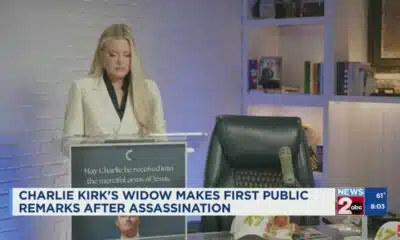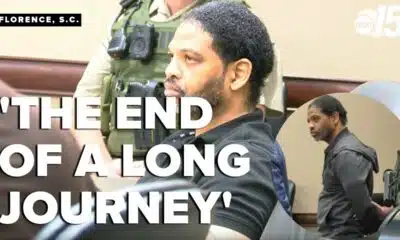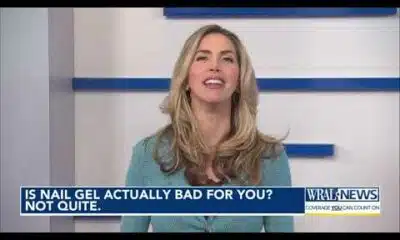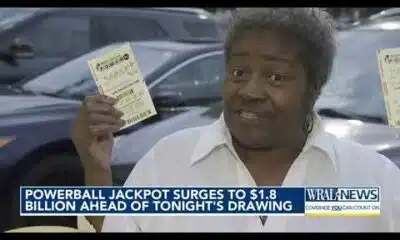News from the South - Virginia News Feed
Virginia GOP feud with conservative wing spills into critical election year
Virginia GOP feud with conservative wing spills into critical election year
by Markus Schmidt, Virginia Mercury
February 19, 2025
With all 100 seats in the House of Delegates and three statewide offices on the ballot this year, Virginia Republicans are navigating internal disagreements that could shape the party’s strategy heading into a pivotal election cycle. Tensions between the 5th Congressional District leadership and the Republican Party of Virginia (RPV) have resurfaced, highlighting broader divisions within the state GOP.
The latest salvo in the intra-party battle came in the form of an open letter, signed by six Republican officials from the hardline conservative 5th District — including Chairman Rick Buchanan and five members of the State Central Committee.
The letter, sent to the committee last week, takes aim at the 80-member body’s Executive Committee, which, during a Dec. 8 meeting, attempted to penalize four local GOP officials by banning them from leadership roles for two years. The officials were ousted in September for refusing to sign a renewed locality pledge of loyalty to former state Sen. John McGuire, R-Goochland, the party’s congressional nominee, who went on to win the Nov. 5 election.
“As we step into a new year, it is vital to reflect on past actions, recognize missteps, and consider how we can position our party for success,” the letter reads. “Leadership requires not only vision but also wisdom — the ability to guide, not punish, and to inspire, not alienate. One recent decision by party leadership warrants serious discussion.”
At issue is a requirement for party officials to reaffirm their support for McGuire following his victory over U.S. Rep. Bob Good, R-Farmville, in last year’s bruising primary. The demand, framed as a “reaffirmation statement,” sparked outrage among some 5th District Republicans, who viewed it as an unprecedented and punitive measure.
“Has there ever been such a demand in the history of our party?” the letter continues. “Have party members, after vigorously supporting a candidate in a primary, ever been forced to sign a statement of loyalty?”
The conflict first flared up in June, when 25 GOP officials from the district signed a letter urging then-presidential nominee Donald Trump to reconsider his endorsement of McGuire and instead back Good, the then-chairman of the ultra-conservative House Freedom Caucus and a staunch Trump ally who had fallen out of Trump’s good graces after endorsing Florida Gov. Ron DeSantis in the Republican presidential primary.
That act of defiance by some of the district’s Republican leadership set off months of tension that culminated in September when each of the 25 officials were asked to sign the renewed pledge. Five refused, arguing they had previously pledged their support for the Republican nominee ahead of the June 18 primary election. As a result, four were stripped off their titles while one submitted his resignation.
Rich Anderson, chairman of the Republican Party of Virginia, defended the initial reaffirmation requirement but acknowledged that the State Central Committee ultimately determined that banning the four officials from leadership roles for two years was excessive.
However, for Buchanan and his allies, the issue remains far from resolved. Their letter criticizes what they see as an attempt to “humiliate, ostracize, and ultimately expel” certain members from leadership for political retribution. They argue that internal divisions, if left unchecked, could weaken the party heading into a critical election year.
“We must ask ourselves: Did these actions help us elect more Republicans?” the letter said. “Did they energize our base? Did they serve to strengthen our party? The answer is a resounding no. Such divisive tactics do not build a winning coalition; they discourage participation, suppress enthusiasm, and fracture the unity we so desperately need.”
Buchanan clarified in a phone interview Monday that the purpose of the letter was not to further divide, but unite the party in order to replicate the 2021 victory of Republican gubernatorial nominee Glenn Youngkin, who flipped Virginia red by increasing turnout in the deeply Republican districts in Southside and Southwest Virginia.
“They are attacking the red counties via us, and yet they’ve got the governor telling them that’s where we need to win elections, that we need to get more people in the red counties out to vote,” Buchanan said, referring to the party’s state leadership.
If Republicans want to win back the majorities in the state legislature and ensure a victory for Lt. Gov. Winsome Earle-Sears, the party’s presumptive gubernatorial nominee, they need to “come up with a message and reach into the homes of the folks that are my neighbors,” Buchanan said.
“That’s the only way, that’s what Youngkin did, and he did it very well. He pushed it, he had a bus tour in Southside and Southwest Virginia, and he came to see us, which is almost unheard of. You’re not going to turn those Democrats, but you can get the people out around here that don’t normally vote except in presidential elections. [But] they are attacking us for something that nobody has ever heard of, they are running people away from the party, they are splitting the party, and I’m very concerned about that.”
A threat to Earle-Sears’ campaign
John Massoud, chairman of the 6th District GOP Committee, also weighed in on the controversy, taking issue with the State Central Committee’s disciplinary measures.
“As a person intimately familiar with what happened in the 5th Congressional District, I vehemently disagreed with the RPV’s insistence that people who did not sign a second loyalty oath be removed,” he said. “My opinion is once you sign the loyalty oath, unless you have broken it, there’s no need to sign a second.”
Massoud emphasized that in his district, where U.S. Rep. Ben Cline, R-Botetourt, faced no primary challenge last year, such disputes did not arise.
“RPV respects us and we respect RPV, we work well together, and sometimes we agree to disagree, and I think a disagreement is not a bad thing,” he said.
While Massoud said he believes free speech and open debate strengthen the party, he remains firm in his opposition to how the committee handled the 5th District situation. “I vehemently disagree with how RPV handled whatever happened in that district with those few people who didn’t sign a second loyalty oath. It wasn’t needed, and RPV knows my opinion on this.”
Ongoing Republican divisions — even if not a widespread issue — could threaten Earle-Sears’ path to the governor’s mansion, warned David Richards, a political science professor at the University of Lynchburg.
“In 2021, Youngkin unified the party by focusing on broad conservative issues like parental school choice, appealing to both moderates and the far right. At the time, the MAGA wing was still recovering from Trump’s loss, and election denialism had not yet become a party loyalty test. That unity boosted GOP turnout in rural areas, helping Youngkin offset Democratic strength in Northern Virginia,” Richards said.
The 2025 election presents a different challenge, Richards added. With the GOP in control of the federal government, Democrats will be more motivated to vote, making party unity even more critical for Republicans.
“If the far right sits out, either due to frustration with Virginia’s GOP leadership or opposition to Earle-Sears, her path to victory narrows significantly. Earle-Sears will need a united party behind her to counter what is sure to be a very united Democratic Party,” Richards said.
Clashes in the Suffolk
And the 5th District isn’t the only place where local Republicans are clashing over party control and loyalty tests.
In Suffolk, GOP infighting reached a boiling point in 2023 when the 2nd Congressional District GOP Committee took the extraordinary step of dissolving the city’s entire Republican committee, erasing a 156-member organization that had been growing its conservative base.
The controversy began during the Republican nomination fight for Senate District 17, when then-Suffolk GOP Chair Dawn Jones filed a lawsuit against the Virginia Department of Elections and the State Board of Elections.
Jones alleged that the state agencies improperly changed the nomination contest from a party-run convention to a primary election, a move she claimed was designed to benefit then-Del. Emily Jordan, R-Suffolk, who was backed by Youngkin, over former NASCAR driver Hermie Sadler. A court eventually ruled in favor of a state-run primary, and Jordan went on to win the GOP nomination and the general election that year.
Jones believes the lawsuit put a target on the Suffolk Republican Committee, particularly as it had allowed Sadler to speak at its meetings — a move she argues was simply in line with party rules, since Jordan was also given the opportunity but chose not to attend. “She was the chosen one,” Jones said in a phone interview Monday.
Shortly after the lawsuit, tensions escalated when the Suffolk committee debated censuring then-House Majority Leader Todd Gilbert, R-Shenandoah, for his refusal to introduce legislation the committee wanted.
Instead of removing Jones, the 2nd District GOP Committee took the unprecedented step of dissolving the entire Suffolk Republican Committee. The panel later appointed a former committee chair to lead a reconstituted Suffolk GOP.
Jones and her allies appealed the decision to the State Central Committee, which upheld it by a majority vote. She claims the move was a calculated purge of strong conservative voices, particularly those seen as too independent of Richmond’s GOP leadership.
“I have come to realize that their objective isn’t to win, it’s to control,” Jones said. “And that’s really the way that I view this.”
Jones argued that Virginia GOP leadership is handpicking candidates behind the scenes, manipulating the process to ensure their preferred individuals secure nominations. According to her, party insiders create an environment where members feel pressured to fall in line, and those who refuse to endorse the “chosen” candidates face retaliation.
She also claimed that party operatives disrupt local GOP meetings, stirring division and chaos to weaken independent-minded committees. “They have what we call disruptors present inside of our meetings, and they will continue to create havoc,” Jones said, adding that she believes this strategy is designed to fracture committees from within, turning members against leadership to justify removals.
In the case of the Suffolk GOP Committee, Jones alleged that party leaders fabricated rule violations to justify its dissolution, specifically because the committee was seen as too independent.
“They try to separate the unit,” she said. “They try to create so much chaos within your local unit that they either are going to try to get people to go against you as a chairman, or, in our case, because we had a very strong unit, they fabricated rules that we may have supposedly broken to basically get rid of us as a unit.”
She also said that before its removal, the Suffolk GOP had been an effective, growing force within the party. “We were 156 people strong. We were making strides. We had moved the needle to the conservative way here in Suffolk by five percent. That’s significant. Since we’ve been dissolved, and they put this other group back in charge, they have lost all those gains,” she said.
As a consequence, many conservative voters in Suffolk now feel alienated from the political process, believing that GOP leadership is rigging the system to favor establishment-backed candidates, Jones said. “I’ve run into people who don’t want to show up because they feel the process has been rigged and that it’s already set. They don’t like the candidates that have been picked, and they’re not going to show up to vote for them.”
However, Anderson, the RPV chair, pushed back against the allegations and defended the decision to dissolve the Suffolk committee, arguing that the panel was dysfunctional and had become a roadblock to GOP success.
“Our job is to elect Republicans, not punish Republicans,” Anderson said, referencing the Suffolk committee’s potential plan to reprimand Gilbert over legislative decisions. He emphasized that lawmakers answer to all voters in their jurisdiction, not just local party activists.
Anderson also said multiple GOP candidates had complained that the Suffolk committee was not working cooperatively with campaigns and was instead undermining party efforts.
He also strongly denied claims that state party leadership manipulates nomination processes or favors certain candidates over others. He insisted that the state GOP remains neutral in contested primaries and does not engage in efforts to anoint preferred candidates.
“The Republican Party of Virginia does not push any candidates, we don’t run any candidates,” he said. “Candidates step forward on their own and seek the nomination on their own. We don’t sponsor candidates, nor do I or other leaders at the Republican Party of Virginia endorse or even privately indicate who we think the nominees should be in a given nomination contest.”
Instead, Anderson emphasized that the party’s role is to act as a neutral arbiter, ensuring that nomination contests are fair and conducted according to party rules. “Our job is to remain as the honest broker, enforce party rule, and ensure a level playing field so everyone gets an equal crack,” he said.
While Jones and other conservatives believe Youngkin’s endorsements influenced nomination battles, Anderson defended the governor’s involvement, arguing that it is separate from the party’s official role.
“He is the leader of our party,” Anderson said of Youngkin. “He’s elected to make tough decisions. He’s in a position where I think he can assess the electability of a given candidate, but one of the things he does not do is enforce party rules.”
Anderson maintained that accusations of backroom maneuvering and forced candidate selection were unfounded, portraying the Suffolk GOP’s removal as a necessary step to restore party order in a unit that was working against Republican interests rather than for them.
“The necessity to take an extreme action of this sort is rare,” Anderson said. “In fact, the Suffolk reconstitution is the only time that there’s been a reconstitution in the five years that I’ve been the state party chairman.”
YOU MAKE OUR WORK POSSIBLE.
Virginia Mercury is part of States Newsroom, a nonprofit news network supported by grants and a coalition of donors as a 501c(3) public charity. Virginia Mercury maintains editorial independence. Contact Editor Samantha Willis for questions: info@virginiamercury.com.
The post Virginia GOP feud with conservative wing spills into critical election year appeared first on virginiamercury.com
News from the South - Virginia News Feed
Area of interest forms in the Atlantic
SUMMARY: On September 11, 2025, Chief Meteorologist Tim Pandages reported on Hurricane Hub Live about tropical developments in the Atlantic and eastern Pacific. In the Atlantic, a low-chance area of interest near the Cabo Verde Islands may become Tropical Storm Gabrielle but requires favorable conditions. Recent tropical waves have struggled due to stable atmospheric conditions. Models show possible development east of the Leeward Islands with a likely recurving path away from Bermuda. In the eastern Pacific, Tropical Depression 13E has formed, expected to become Hurricane Mario, the season’s 8th hurricane. The Atlantic has had only one hurricane so far, Major Hurricane Aaron. Activity is expected to increase into October.
The newly formed area of interest could become Invest 92-L off the coast of Africa. Find out about that and more during tonight’s episode of Hurricane Hub LIVE! Livestream from Thursday, September 11, 2025.
Subscribe: https://www.youtube.com/user/wvectv/?sub_confirmation=1
Download the 13News Now app: https://bit.ly/13NewsNowApp
Watch 13News Now+ for free on streaming: https://www.13newsnow.com/13NewsNowPlus
Check out our website: https://www.13newsnow.com/
Like us on Facebook: https://www.facebook.com/13newsnow/
Follow us on X/Twitter: https://x.com/13newsnow
Follow us on Instagram: https://www.instagram.com/13newsnow/
News from the South - Virginia News Feed
Cat cafes, chromotherapy and pumpkin delivery: Here’s what’s new in RVA this September
SUMMARY: This September in RVA, Patch to Porch RVA delivers handpicked pumpkins from local farms, offering design, setup, and cleanup services for homes and events in Richmond, Henrico, and Chesterfield. Shore Pump introduces Beam Light Sauna, featuring infrared sauna and chromotherapy, promoting detox, skin renewal, and wellness with customizable sessions and memberships. The Fan now hosts River City’s first cat café, The Perfect Bean, combining a coffee bar with an adoptable cat lounge upstairs. Sourced locally, their drinks include seasonal, cat-themed specials. Cats come from Purring Hearts VA rescue, offering adoption opportunities, fostering community engagement and animal welfare.
What’s New in RVA is dedicated to informing you about the latest happenings in the Richmond area.
News from the South - Virginia News Feed
Congressional measure honors Angelina Resendiz, aims to help future servicemembers
SUMMARY: Texas Congressman Vicente Gonzalez has proposed legislation honoring seaman Angelina Resendiz, aiming to improve military accountability for missing servicemembers. Resendiz was reported as absent without leave (AWOL) more than a week before her death, prompting calls for clearer reporting on armed forces members found deceased under similar circumstances in the past decade. The amendment requires the Secretary of Defense to provide Congress with comprehensive reports on such cases, ensuring the military properly distinguishes between AWOL and duty status whereabouts unknown. Advocates argue this will enhance safety and accountability in the armed forces. A sailor is currently in pretrial confinement linked to Resendiz’s death, with a hearing scheduled for September 18 in Norfolk.
The lawyer for Seaman Angelina Resendiz’s family is speaking out after one Texas congressman introduced an amendment in honor of the sailor.
Subscribe: https://www.youtube.com/user/wvectv/?sub_confirmation=1
Download the 13News Now app: https://bit.ly/13NewsNowApp
Watch 13News Now+ for free on streaming: https://www.13newsnow.com/13NewsNowPlus
Check out our website: https://www.13newsnow.com/
Like us on Facebook: https://www.facebook.com/13newsnow/
Follow us on X/Twitter: https://x.com/13newsnow
Follow us on Instagram: https://www.instagram.com/13newsnow/
-
News from the South - North Carolina News Feed6 days ago
Reagan era credit pumps billions into North Carolina housing | North Carolina
-
News from the South - Alabama News Feed6 days ago
Amid opposition to Blount County medical waste facility, a mysterious Facebook page weighs in
-
News from the South - South Carolina News Feed6 days ago
South Carolina’s Tess Ferm Wins Miss America’s Teen 2026
-
News from the South - Kentucky News Feed6 days ago
3 states push to put the Ten Commandments back in school – banking on new guidance at the Supreme Court
-
News from the South - West Virginia News Feed5 days ago
Protesters in D.C. flood the streets demanding an end to Trump’s military deployment
-
Local News6 days ago
Duke University pilot project examining pros and cons of using artificial intelligence in college
-
News from the South - Missouri News Feed5 days ago
1587 Prime gives first look at food, cocktail menu ahead of grand opening in KC
-
News from the South - North Carolina News Feed7 days ago
Powerball surges to $1.8B ahead of Saturday's drawing











































